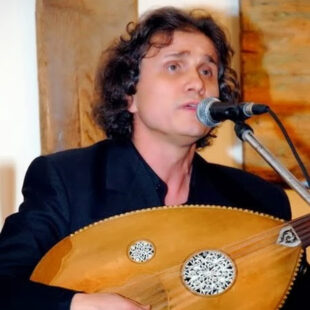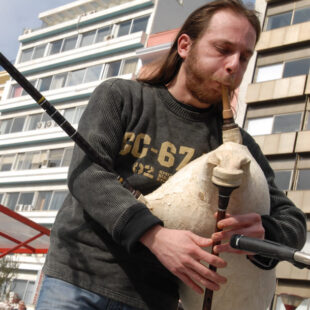00:00
Home / Her Work / Song Catalogue / I Passed by and Bade Good Day
I passed by and bid four black eyes good day,
four lips, dear Daphne, four red lips.
Four red lips and two lithe, slender frames,
I passed them by, dear Daphne, and asked them the way;
they didn’t say a word, and I set off anyways.
Along the road, the lonely overgrown path,
and came out at an old country chapel.
Its cemetery abristle with graves in rows;
and one grave over yonder moaning and sighing away.
“What ails you, grave, why do you moan and sigh?
Does the earth weigh heavy,
does your tombstone block the light?”
“My earth does not weigh heavy, my tombstone blocks no light;
it’s you that ails me, standing upon my head.
If you’re a young man, enjoy your life;
and if you’re old and grey, I’ll rise up and take you.
[Don’t think I was not a brave young lad,
don’t think I didn’t walk abroad in the light of the moon,
just because I lie buried now deep inside the earth]”.
Translated by Michael Eleftheriou
Πέρασα, καλημέρισα τέσσερα μαύρα μάτια,
τέσσερα χείλια, Δάφνη μ’, κόκκινα.
Τέσσερα χείλια κόκκινα κι δυο λιγνά κορμάκια,
πέρασα, Δάφνη μ’, κι τα ρώτησα,
πέρασα κι τα ρώτησα του δρόμου να μι δείξουν,
κι κείνα δε μου μίλησαν κι κίνησα κι πάω.
Παίρνου του δρόμου του στρατί, τ’ άδειου του μονοπάτι,
του μονοπάτι μ’ έβγαλι σι μια παλιοκκλησίτσα.
Βρίσκου τα μνήματα πυκνά, πυκνά κι αραδιασμένα
κι ένα μνήμα παράμερα βογγάει κι αναστινάζει.
«Τι έχεις, μνήμα μ’, κι βουγγάς κι βαριαναστινάζεις;
Μην είν’ του χώμα σου βαρύ κι η πέτρα σου μιγάλη;»
«Δεν είν’ του χώμα μου βαρύ κι η πέτρα μου μιγάλη,
εσύ ’σι που μι πάτησις πάνω στην κεφαλή μου.
Αν είσι νιος, να χαίρισι, κι αν είσι παλληκάρι·
κι αν είσι κάνας γέροντας, να βγω κι να σι πάρω.
[Τι γαρ ιγώ δεν ήμαν νιος, δεν ήμαν παλληκάρι,
τι γαρ ιγώ δε γύρισα νύχτα μι του φιγγάρι,
κι τώρα πώς κατάντησα να ’μι βαθιά στου χώμα]».
This song, along with Little Apple Tree Perched on the Brink, is linked to the folk belief that a dead person’s soul becomes enraged when its peace is disturbed. The plot is simple: a young man, out wandering at night in pursuit of revelry or love, strays from his path and ends up in a cemetery, where he unknowingly steps on the grave of a young man. The contrast that arises from this profane encounter between the dead and his living peer —the dead man’s plaintive words from within the grave, the memories of his lost youth— ultimately becomes a philosophical reflection on the fleeting and fragile nature of life.
Miranda Terzopoulou (2008)
Studio recording (2006). Based on Yiorgos Amarantidis’ 1970s field recording of the song from Traïani and Thodoros Pitsanis, a married couple, made during their stay in Athens for appearances at the Dora Stratou Theatre. Residents of the village of Kitros in Pieria, Traïani and Thodoros were refugees from Bana, Eastern Roumelia. Amarantidis later handed the tape with the collected songs to Domna Samiou for inclusion in her archive.

Singers

Gaida (bagpipe)

Daouli (davul)

Informant (source of the song)